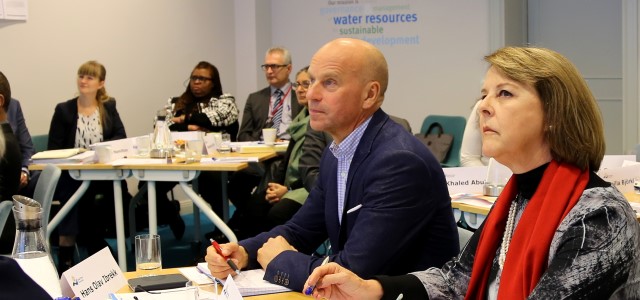With the adoption of the Sustainable Development Goals (SDGs) and the dedicated water target (SDG 6), the world community set specific targets – to ensure availability and sustainable management of water and sanitation for all by 2030.
“We all need to deliver on this common target. It will be a challenging task and all actors need to scale up their efforts. Improving water resources management, including governance, is key to this”, says Ibrekk. And Norway has a lot to offer.
"Norway has a strong track record in water resources management. One area of expertise is the management of and utilization of water resources for hydropower development. Nearly all our electricity is based on hydropower. Within development cooperation, Africa is a priority. Governance – at global, regional and national levels – lies at the heart of water management. Efforts to improve governance are therefore key”, says Ibrekk.
Growing Pressure and Tensions
Challenges around water management are already immense. On the one hand, over a billion people lack access to improved water. Some 2.7 billion – or 40% of the world’s population – suffer water shortages for at least a month each year. Water management is further complicated by economic pressures – developing an economy can be a thirsty business, based on unsustainable use of water. Globally, based on current trends, water demand is projected to exceed sustainable supply by 40% in 2030. Adding to the pressures, agricultural production will have to increase in the coming decades to feed a growing population and a rising demand for meat.
“Unless current water management practices change significantly, many parts of the world will face growing competition for water between agriculture, energy, industry, and cities. The potential for climate change to exacerbate water crises calls for improved water governance. Tensions are likely to grow within countries, especially between rural and urban areas, between poorer and richer areas, and between user groups and also potentially between jurisdictions”, says Ibrekk.
Global Threat to Water Security
The issue of water risk has already moved up on the international and corporate agenda. Global water crises – from drought in the world’s most productive farmlands to the hundreds of millions of people without access to safe drinking water – are the biggest threat facing the planet over the next decade. This is the sobering finding of the World Economic Forum’s Global Risks Reports.
“Strengthening water resources management at all levels will be key to address this threat. Water resources and how they are managed impact almost all aspects of society and the economy, in particular health, food production and security, domestic water supply and sanitation, energy, industry, and the functioning of ecosystems. Without improvement, the progress towards poverty reduction targets, and sustainable development in all its economic, social and environmental dimensions, will be jeopardized,” says Ibrekk.
“Water is unfortunately not high on the political agenda even though the business community has ranked it as one of the top 3 global risks,” says Ibrekk.
“Water is the primary medium through which climate change influences earth’s ecosystem and thus the livelihood and well-being of societies. The poor, who are the most vulnerable, are likely to be adversely affected. Improved water resources management is definitely a critical part of the solution to climate change. Therefore, GWP has a key role to play,” says Ibrekk.
Photo: Hans Ove Ibrekk at the GWP Financial Partners Meeting, December 2016.

